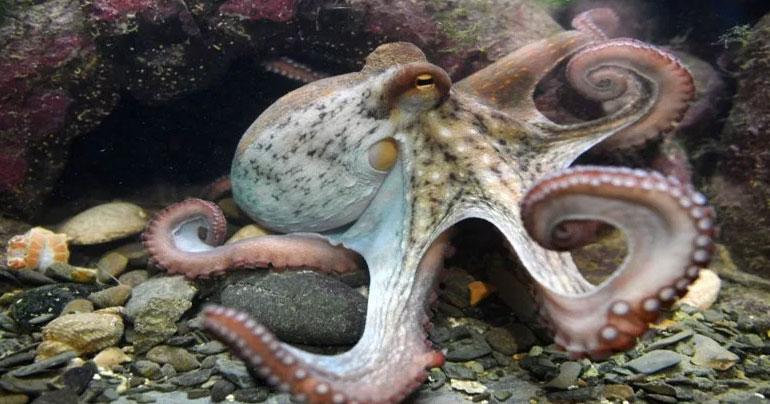Scientists claim octopuses are actually ’aliens’
In April last year, researchers found octopuses — and some of their cuttlefish and squid cousins — regularly edit their RNA. This sets them apart from the rest of the animal world. RNA, like DNA, records genetic code. But where DNA is a double-stranded molecule, RNA consists of just one strand.
A study performed by a group of scientists reportedly brings to light that octopus may have come to the Earth as frozen eggs some two hundred fifty million years before and may have had their actual evolution on some other world. This conclusion made by the researchers is due to the mysterious power that the octopuses possess.
The octopuses and their entire class of cephalopods are known to possess the ability of editing their bodies. The scientists are yet to understand the secrets behind it as evolution never functions in that manner. The biologists regard this as an “advanced biological capability,” which emerged from the outer space.
Last year, in the month of April, a group of researchers discovered that the octopus, including the squid and cuttlefish, rephrase their RNA regularly. This aspect sets the species as something unique from the others living in the animal world.
Just like that of the DNA, the RNA has the genetic codes recorded on it. However, the DNA molecule is double-stranded whereas the RNA molecules have only a single strand. It works for transmitting the genetic information in the body thereby triggering protein production. However, the researchers of the study feel that in the early organisms of the Earth, the RNA might have been working as the DNA, by storing the genetic codes permanently in them.
The researchers revealed that on studying some of the members of the cephalopod class, such as the squid, they observed near about sixty percent of their RNA in their nervous system to have been edited post to being programmed by the DNA. These transformations reportedly made them adapt to the shift in temperatures in the oceans.
Joshua Rosenthal, the US Marine Biological Laboratory researcher said that the research showed that the “high level of RNA editing” is probably an “invention of the coleoid cephalopods.” However, it is yet not known as to how this functionality gets triggered. Rosenthal further said, “It could be something as simple as temperature changes or as complicated as experience, a form of memory.”
It would not be a mistake saying that this ability of the creatures has arrived at a cost. Rosenthal said that for maintaining their flexibility of editing the RNA, the creatures had to lose the ability of evolving in the neighboring areas.
The study claimed that “space-based transfer of life” was much more prominent than imagined. A lot of icy genetic substances were thrown into the oceans of the Earth by stellar winds. Those substances reportedly thawed on reaching the earth. Hence, the eggs of octopus could have arrived on the Earth in a similar way.
An ecstatic video featuring a baby dumbo octopus has left the viewers spellbound. The dumbo octopuses are one of the deepest sea creatures and glow pearly white amid the darkness of the ocean. These dumbo octopuses cruise through the chilly deep oceans with their eight muscular arms and two big flapping ears. But what fascinates people more is the baby dumbo octopus which looks like its parents but is very tiny.
The adorable first ever video of a newborn dumbo octopus will definitely surprise the viewers. The video of the baby octopus was taken in the year 2005 by Tim Shank, an ecologist at the Woods Hole Oceanographic Institution. Tim Shank recently uploaded the video of the newborn dumbo octopus and also published a research paper accompanying the video in the Journal Current Biology. Shank’s study revealed that the baby dumbo octopuses behave like adults almost instantly after taking birth. They could swim, survey their environment and detect chemical signals. They even could catch their prey as they get Well-developed suckers on their arms since their birth. Elizabeth Shea, curator of mollusks at the Delaware Museum of Natural History said, “Once the fins were observed while the hatchling was still in the bucket, it was clear that it was a ‘dumbo’ octopod.”
Share This Post






